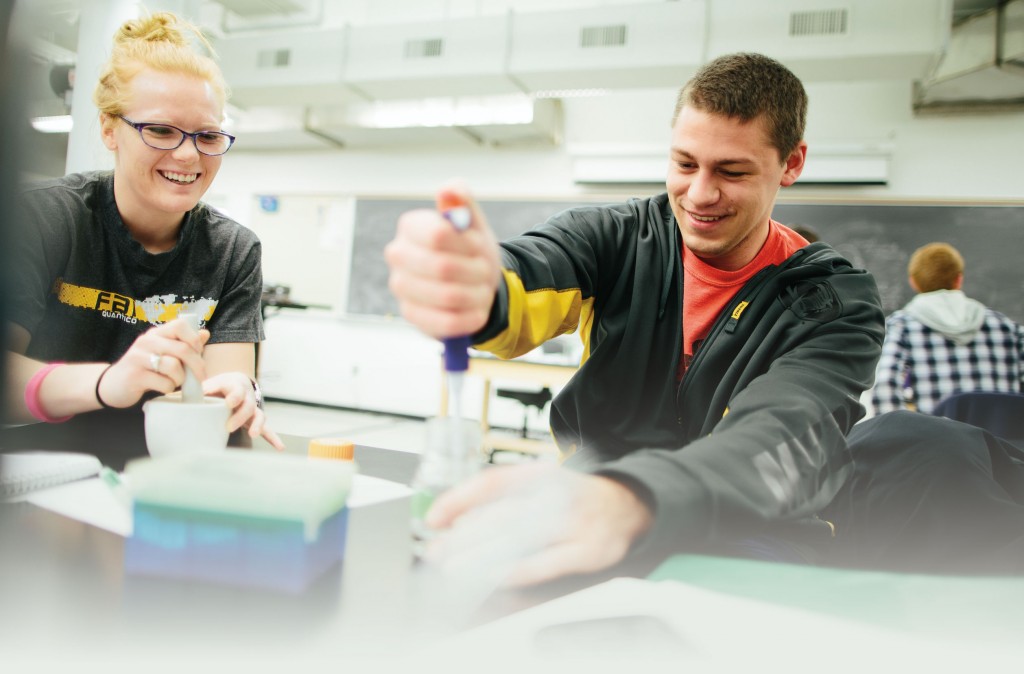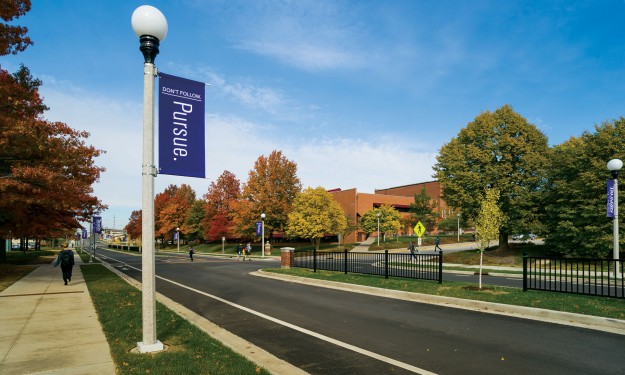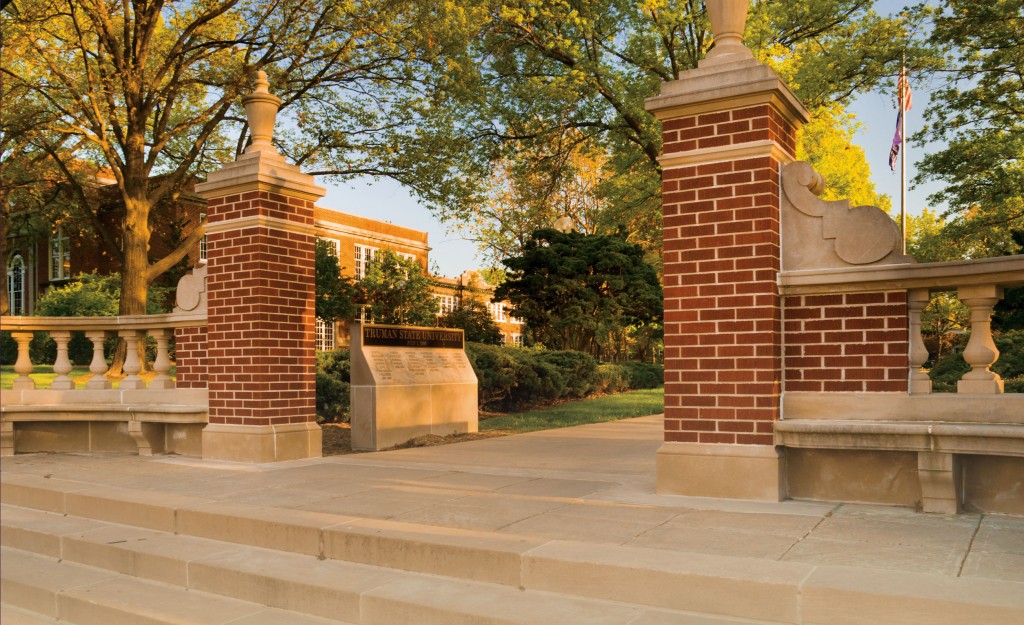While Truman continues to enjoy a growing national reputation for the outstanding education it provides, the University is facing some significant challenges in higher education. One challenge is the changing demographics. Starting with the high school graduating classes of 2010, Truman has been experiencing declining high school populations in Missouri and the Midwest. Within this shrinking number, Truman has seen an increase in the number of students who traditionally do not go to college, or if they do, they stay close to home.
Adding to that challenge is the fact Truman is the only Missouri university with a highly selective mission. Truman is working to recruit 1,300-plus students who are incredibly bright and talented, while other schools only need to capture a small percentage of those talented students for their entering classes. The University is also dealing with the daily changing landscape of higher education and the influence of technology. Truman must constantly be answering the question “How does a residential liberal arts university fit into a world where everyone is talking about massive open online classes (MOOCs), online education and workforce development?” Truman like so many others, is faced with scarce resources and the ongoing question of “How do we maintain our reputation for quality and affordability with fewer state resources and growing student debt?”
Given these challenges, it became clear that the University needed consistent and repetitive messaging which reinforces the amazing Truman story. Truman has so much to be proud of in the areas that really matter. The University has the highest graduation rate of any Missouri public university and the highest freshman-to-sophomore retention rates. At a time when students are concerned about the affordability of a high-quality education, Truman delivers. Truman has the lowest student-loan default rate in the state (except for Washington University), proving that a Truman degree has currency in the market. The University’s three-year student loan default rate is 3.7 percent while the national average is 14.75 percent and Missouri average is 13.1 percent. Half of Truman’s students graduate without any student debt and the other half graduate well below the national average.
Recognizing the need to clarify the University’s brand in this message-drenched world, Truman engaged the Stamats higher education marketing firm from Cedar Rapids, Iowa, in January 2013 to assist with the University’s marketing and communication efforts as well as a redesign of the website. They began that comprehensive process by coming to campus to interview administrators, faculty, students and staff to develop a deep understanding of Truman’s strengths and key attributes. Surveys were conducted with members of the campus community, prospective students and parents to establish how Truman is perceived in the marketplace. The surveys also sought to identify key strengths, challenges and differentiating characteristics of Truman for these external audiences. A final survey assessed the perceptions of the University among its alumni. The research, using a combination of qualitative and quantitative methods, helped identify perceptions of the University, its competitive strengths and differentiators, descriptors and attributes perceived as distinctive to Truman, and the institutional positions and promises most valued by Truman’s audiences.
Using the market research and institutional mission, vision, values and strategic plan as guides, the University identified a brand promise statement that could most effectively reflect the words, phrases and messages determined to be the strongest descriptors of Truman among all its constituents. A brand tells a story. Truman’s story is that the University delivers an amazing value, and it is a place where dedicated professors guide talented students as they grow into capable professionals, engaged citizens and supportive colleagues.
 Using the research, four attributes that differentiate Truman from other universities and support the brand promise were developed:
Using the research, four attributes that differentiate Truman from other universities and support the brand promise were developed:
Intellectual and Curious
Individually and collectively, people at Truman are driven to know, to learn, to understand and to extend the reach of their shared knowledge. Truman students and alumni have an intellectual character that is undeniable and distinctive within the competitive landscape. It’s about actively seeking and understanding—asking “why?” one more time. There is a pragmatism, humility and humanity at Truman that is expressed by “curious.” Examples include:
• About half of all graduating seniors immediately enter graduate or professional school;
• Truman seniors report their courses emphasize “making judgments about the value of information, arguments or methods” more often than their counterparts at Council of Public Liberal Arts Colleges (COPLAC) schools and any of the 2012 National Survey of Student Engagement (NSSE) institutions;
• Based on its graduates’ passage of the Certified Public Account (CPA) exam, Truman ranks fourth nationally among large programs and ninth among all programs.
A Lively Community of Learners
A largely residential campus, by design and by geography, Truman brings together more than 6,000 people for the primary purpose of learning. Although the drive to know may be individual, Truman community members work together, challenge each other and care for each other and the world. Truman faculty are involved teachers, mentors and advisors. They are also often neighbors to their students. Older students advise younger students. Majors tutor non-majors. Students disperse into the Kirksville community to rake leaves and clean parks. They stage performances and exhibits. They create clubs and movements. Most of the campus “play” has a larger purpose, and working together for a purpose often sets the stage for play, recreation and service to others. Some examples include:
• Truman students participate at a higher rate in cocurricular activities and service-learning projects than students at COPLAC schools or the 2012 NSSE institutions;
• 87 percent of students are active in one of the 200-plus clubs or student organizations, and 72 percent of students are involved with more than one organization.
Discovering Connections Across a Wide Range of Endeavors
Truman students seek breadth as well as depth in their studies and in their lives, learning to ask thoughtful questions, making surprising connections and communicating effectively across perspectives. This attribute allows Truman to speak to the way a broad education teaches students to articulate connections, a skill that translates into innovation and effective communication throughout one’s life and work. Furthermore, Truman students have the opportunity to connect what is learned in the classroom to endeavors that prepare them for career entry—research, internships, study abroad and service-learning. In a global and technologically accelerating world, every field, from agriculture to nursing to theatre, requires a grasp of culture, history and science, and the ability to adapt and interpret information and interactions. Some examples include:
• 97.8 percent of surveyed alumni (the 2006 and 2001 classes, surveyed in 2011 at the five-and 10-year mark, respectively) believe that they were able to perform as well or better than their colleagues who may have earned degrees with non-liberal arts backgrounds and heavy discipline emphasis;
• This same group of alumni indicated that they were adequately prepared in all areas and especially prepared with respect to combining knowledge from multiple areas to solve problems.
Preparing for Lives That Matter
Fueled by a desire to make a difference, Truman students and alumni turn their intellectual pursuits and emotional connections into action, whether in a profession such as medicine or education, in an endeavor such as scientific research or business leadership, or through community and public service. In both academic and cocurricular activities, Truman students engage with substantive questions and find ways to make that difference. The faculty and staff who mentor and support them are themselves engaged and active, pursuing what matters. As individuals, as an institution and as a community, Truman pursues the questions and faces the challenges of our time. Examples include:
• In a 2012 survey of employers of Truman alumni, those employers rated their Truman educated employees as good to excellent in their ability to get along with co-workers and clients, in their demonstration of a personal value system, in their speaking and presentation skills, and in basic work habits (honesty, promptness, diligence, dependability, etc.) and work attitudes (cooperation, loyalty, support, etc.);
• Alumni (2006 and 2001 classes, surveyed in 2011 at the five- and 10-year mark, respectively) indicated that they were adequately prepared in all areas and especially prepared with respect to getting along with others, speaking and presenting effectively, exercising leadership, making informed and ethical decisions and contributing as a citizen of the community;
• Overall, Truman seniors believe that they have gained good to excellent skills in understanding their own abilities, interests and personality, working cooperatively with a group, respecting the uniqueness and worth of each individual, persisting with difficult tasks, and leadership.
Embracing Truman’s New Theme
For those who were on campus at Homecoming, you have seen the following words: Don’t Follow. Pursue. The campus community chose these words carefully for the University’s tagline, as they have energy and forward momentum. The words resonate emotionally and they are true to Truman’s character and purpose. It’s simple, clear and directive—as important for those who are uncertain about their direction as those who have definite goals. The energetic fusion of intellect and emotion in this expression distinguishes Truman from commonplace and elite competitors alike. It promises the passionate life of the mind and tangible rewards, won through individual effort. Students and alumni alike discover extraordinary horizons to match their extraordinary talents—because of Truman.
Sometimes
You have to follow—to learn a new tune, a new language or a new way of looking at everything you’ve known since forever. Sometimes, something sparks. A seed germinates. You hunger to get it—right, complete, shining and whole. To make it your own. You are no longer following. You are pursuing. And then you discover you have company in the pursuit. Friends and mentors to laugh with and to rely on. That’s what we’ve found at Truman. People who share our passion for the pursuit of—knowledge, ability, community, a better world, happiness. Join the pursuit. It’s better with friends.
Always.
(taken from the Truman Admission Viewbook)
As alumni and friends of Truman, you know better than anyone why Truman is a great school. If you know of a potential student who would be a good fit for Truman, be sure and visit with them and encourage them to apply at admissions.truman.edu/apply/application.asp. There is still time to apply for the fall semester and it’s free.
High School Teachers
If you are teaching in a local high school or you know of Truman alumni who are teachers and staff in your local high school, please let us know by emailing pr@truman.edu.
Truman Pride Points
Kiplinger’s Personal Finance magazine recently released its list of the top 100 Best Values in Public Colleges and Truman ranks No. 12 in the nation for schools that deliver a high-quality education at an affordable price. Truman is the highest-rated Missouri school on Kiplinger’s list and was the only university in the state to be included in the top 50. Truman is also ranked 9th in the nation for best out-of-state value and is highlighted on the website that features the top 10 out-of-state schools at kiplinger.com. The annual public school rankings appear in Kiplinger’s February 2014 magazine. Check out the additional Truman national accolades on the back page of the Truman Review.



